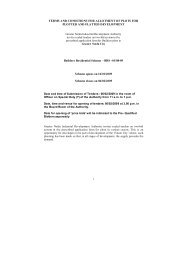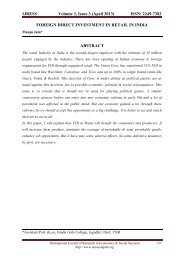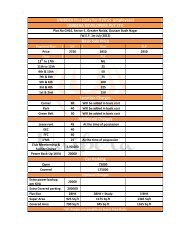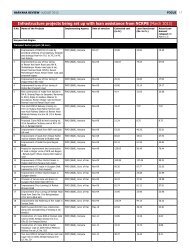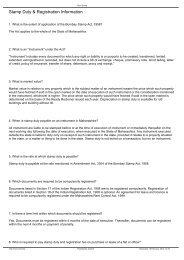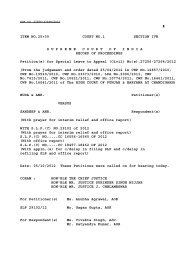eLegalix - Allahabad High Court Judgment Information System ...
eLegalix - Allahabad High Court Judgment Information System ...
eLegalix - Allahabad High Court Judgment Information System ...
Create successful ePaper yourself
Turn your PDF publications into a flip-book with our unique Google optimized e-Paper software.
JUDGMENT/ORDER IN - WRIT - C No. 37443 of 2011 at <strong>Allahabad</strong> Dated-21.10....http://elegalix.allahabadhighcourt.in/elegalix/WebShow<strong>Judgment</strong>.doPage 142 of 19710/21/2011urgency contemplated under Section 17 (1) and unforeseen emergency contemplated under Section 17 (2) existsthat by itself would not contain the need for dispensing with 5A inquiry. It is possible in a given case the urgencynoticed by the appropriate Government under Section 17(1) or the unforeseen emergency under Section 17(2)itself may be of such degree that it could require the appropriate Government on that very basis to dispense withthe inquiry under Section 5A but then there is a need for application of mind by the appropriate Government thatsuch an urgency for dispensation of the 5A inquiry is inherent in the two types of urgencies contemplated underSection 17 (1) and (2) of the Act.33. An argument was sought to be advanced on behalf of the appellants that once the appropriate Governmentcomes to the conclusion that there is an urgency or unforeseen emergency under Section 17(1) and (2), thedispensation of enquiry under Section 5A becomes automatic and the same can be done by a composite ordermeaning thereby that there no need for the appropriate Government to separately apply its mind for any furtheremergency for dispensation with an inquiry under Section 5A. We are unable to agree with the above argumentbecause sub- section (4) of Section 17 itself indicates that the "government may direct that provisions of Section5A shall not apply" which makes it clear that not in every case where the appropriate Government has come tothe conclusion that there is urgency and under sub- section (1) or unforeseen emergency under sub-section (2) ofSection 17 the Government will ipso facto have to direct the dispensation of inquiry.34. A careful reading of the above judgment shows that this <strong>Court</strong> in the said case of Nandeshwar Prasad's case(supra) has also held that there should an application of mind to the facts of the case with special reference to thisconcession of 5A inquiry under the Act."To the same effect there is a judgment of the Apex <strong>Court</strong> in the case of Union of India and others vs. Krishan LalArneja reported in 2004(8) SCC 453 in which same proposition was laid down. The Apex <strong>Court</strong> laid downfollowing in paragraph 16 of the judgment which is as under:-"16. Section 17 confers extraordinary powers on the authorities under which it can dispense with the normalprocedure laid down under Section 5A of the Act in exceptional case of urgency. Such powers cannot be lightlyresorted to except in case of real urgency enabling the Government to take immediate possession of the landproposed to be acquired for public purpose. A public purpose, however, laudable it may be, by itself is notsufficient to take aid of Section 17 to use this extraordinary power as use of such power deprives a land owner ofhis right in relation to immoveable property to file objections for the proposed acquisition and it also dispenseswith the inquiry under Section 5A of the Act. The Authority must have subjective satisfaction of the need forinvoking urgency clause under Section 17 keeping in mind the nature of the public purpose, real urgency that thesituation demands and the time factor i.e. whether taking possession of the property can wait for a minimumperiod within which the objections could be received from the land owners and the inquiry under Section 5A of theAct could be completed. In other words, if power under Section 17 is not exercised, the very purpose for which theland is being acquired urgently would be frustrated or defeated. Normally urgency to acquire a land for publicpurpose does not arise suddenly or overnight but sometimes such urgency may arise unexpectedly, exceptionallyor extraordinarily depending on situations such as due to earthquake, flood or some specific time-bound projectwhere the delay is likely to render the purpose nugatory or infructuous. A citizen's property can be acquired inaccordance with law but in the absence of real and genuine urgency, it may not be appropriate to deprive anaggrieved party of a fair and just opportunity of putting forth its objections for due consideration of the acquiringauthority. While applying the urgency clause, the State should indeed act with due care and responsibility.Invoking urgency clause cannot be a substitute or support for the laxity, lethargy or lack of care on the part of theState Administration."In a later case reported in (2010)11 S.C.C. 242; Anand Singh vs. State of U.P. and others all earlier cases havebeen referred to and the principles of invoking Section 17(4) of the Act have been restated. It was further laiddown in the said judgment that, generally speaking, development of an area for residential purpose or planneddevelopment takes many years and in every case of planned development dispensation of inquiry under Section5A of the Act is not required. The Apex <strong>Court</strong> in the aforesaid case further observed that ratio of two Judge Benchin State of U.P. vs. Pista Devi case (supra) is contrary to the ratio laid down in earlier three Judge Benchjudgment in Narayan Govind Gavate's case (supra). As noted above, in Narayan Govind Gavate's case (supra)the three Judge Bench has laid down that scheme for housing development or industrial development, barringexceptional cases, does not satisfy the invocation of Section 17(4) whereas in State of U.P. vs. Pista Devi case(supra) it was held that housing scheme is a national urgency. The principles, after referring all earlier cases, werelaid down in paragraphs 42, 43, 44, 45, 46, 47 and 50 of the judgment which are as under:-"42. When the government proceeds for compulsory acquisition of particular property for public purpose, the onlyright that the owner or the person interested in the property has, is to submit his objections within the prescribed





